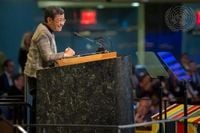On the eve of the United Nations’ 80th anniversary, the battle for truth and democracy is being waged not only in war zones but also in the digital sphere. Maria Ressa, the Nobel Peace Prize-winning journalist and co-founder of Rappler, has become one of the most prominent voices warning about the dangers of authoritarianism, disinformation, and the erosion of free speech. In a series of high-profile appearances and interviews in September 2025, Ressa drew urgent parallels between her harrowing experiences under the Duterte regime in the Philippines and the current political climate in the United States under President Donald Trump.
Speaking with Jon Stewart on The Daily Show on September 22, Ressa did not mince words about the gravity of the moment. "It’s both deja vu and PTSD," she told Stewart, reflecting on what she sees as an alarming echo of the tactics she witnessed—and endured—during Rodrigo Duterte’s presidency. According to The Daily Show, Ressa was jailed in 2020 for her fearless reporting on Duterte’s government, which was notorious for its crackdown on dissent and manipulation of public discourse.
Now, watching from afar, Ressa expressed deep concern over the U.S. president’s recent actions against the media. After Disney removed comedian Jimmy Kimmel from the air in what many saw as a move to appease President Trump and his hand-picked Federal Communications Commission chair, Ressa warned Americans about the dangers of such authoritarian attacks on free speech. "The similarities between the dictatorship I lived under and the Trump administration are chilling," she said, as reported by The Daily Show.
Ressa’s warnings are rooted in her own lived experience. Under Duterte, she was repeatedly arrested for reporting on corruption, human rights abuses, and the weaponization of social media—a pattern she now sees repeating elsewhere. As she explained on Boston Public Radio, the manipulation of information and the targeting of journalists are hallmarks of rising authoritarianism. "I look out on America in this current moment with 'deja-vu' and 'PTSD' from my own experiences living through authoritarianism," Ressa revealed during her May 2025 conversation, which was rebroadcast on September 22.
But Ressa’s concerns extend beyond individual leaders. She and Stewart discussed how major technology companies are complicit in these trends, using the playbooks of authoritarian governments to inform their algorithms. These algorithms, Ressa argued, are designed not just to maximize profit through surveillance capitalism, but also to manipulate democratic elections and erode the very foundations of civil society. "Tech companies use authoritarian governments as case studies to design algorithms that manipulate democratic elections," Ressa said, according to The Daily Show.
This manipulation, she warned, is not confined to the virtual world. "The biggest battle we face today is impunity – and it leads to our dehumanization: in both the physical world, where wars rage from Ukraine to Gaza; and in the virtual world, where our minds and emotions are manipulated by surveillance capitalism for profit," Ressa declared at the United Nations General Assembly’s 80th anniversary commemoration on September 23, as reported by Rappler. Her message was clear: the line between digital and physical threats to democracy is increasingly blurred.
At the United Nations event, Ressa was one of five distinguished speakers, sharing the stage with Secretary-General António Guterres, President of the General Assembly Annalena Baerbock, former Liberian president Ellen Johnson Sirleaf, and former WHO director-general Gro H. Brundtland. Addressing a hall filled with diplomats and world leaders, Ressa issued a rallying cry: "Information integrity is the mother of all battles. Win this, and we can win the rest. Lose this, and we lose everything." She urged the international community to "choose courage over comfort, facts over fiction, hope over fear."
Ressa’s call to arms is rooted in the foundational values of the United Nations—peace, human rights, justice, and the rule of law. "A lot has changed since the UN was created 80 years ago, but its values – peace, human rights, justice, rule of law – are more essential today than ever. It’s time to create again: to build better," she said, as quoted by Rappler. Her plea was not just for institutional reform, but for a renewed commitment to the principles that underpin democratic societies.
The stakes, as Ressa sees them, could not be higher. With wars raging from Ukraine to Gaza and democratic institutions under siege from both external and internal threats, the battle for information integrity is, in her words, the "mother of all battles." Without it, she warned, the world risks sliding into a new era of impunity and dehumanization.
Ressa’s activism is not limited to grand speeches or televised interviews. She has consistently emphasized the importance of peaceful, collective action to defend democratic rights. In her conversation with Stewart, she urged Americans to take peaceful steps to protect their rights before they are "continually stripped away." The message, though directed at an American audience, resonates globally: the defense of democracy is everyone’s responsibility, and it requires vigilance, courage, and solidarity.
Her warnings carry particular weight given her own sacrifices. As chronicled by Boston Public Radio, Ressa’s repeated arrests in the Philippines were a direct result of her commitment to exposing corruption and standing up to authoritarian power. Her experiences have made her acutely sensitive to the early warning signs of democratic backsliding, whether in Manila or Washington, D.C.
Yet, Ressa remains hopeful. At the United Nations, she called for a renewed spirit of creation and rebuilding. "It’s time to create again: to build better," she told the assembled leaders and diplomats. For Ressa, the fight for information integrity is not just about resisting authoritarianism, but about reimagining and strengthening the institutions that safeguard human dignity and freedom.
As the world marks the 80th anniversary of the United Nations, Ressa’s message is both a warning and a call to action. The battle for truth, justice, and democracy is far from over—but with courage, vigilance, and a commitment to facts, it is a battle that can still be won.

